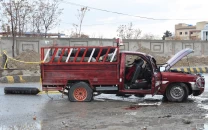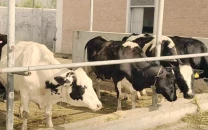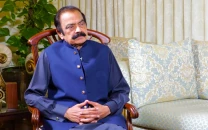‘India ripe for revolution, Pakistan not’
Panda predicts revolution in India, assails South Asian governments for repeatedly failing to deliver.

According to him India was ripe for a revolution as the rulers were oblivious of the peoples needs and their demand. “I can see it happening in India, the process of revolt is already there,” Panda said in an interview with the The Express Tribune. Panda was in Islamabad recently to attend a two-day South Asian parliamentarians’ roundtable on food sovereignty.
Panda, who is President of the Communist Party of India (CPI), expressed harsh views on the global economic system and called for increased contact between ordinary Pakistanis and Indians.
“Revolution is a word that has a resounding quality in the political discourse of present day Pakistan, but no one willing to ‘spearhead’ such a movement seems to be in sight. When asked about his views on the matter, the Indian MP replied “I cannot say about Pakistan but the people in India are certainly ready for a revolution.”
Panda, who also presides over the Communist Party of India and the All India Kissan Sabha, could not say how long it would take for Indians to actually come out on the streets. “I cannot give a specific timeframe,” he said, but argued, “A government that does not bother to resolve the people’s problems does not retain the right to stay in power.”
The countries of the South Asian Association for Regional Cooperation (SAARC) pledged, in their Millenium Development Goals, to make the region hunger-free by the year 2013. It seems they are nowhere near achieving that goal. “These governments do not have the strength to create a self-reliant economy to support social sector development,” said Panda.
“There has not been a single visible initiative by any of the SAARC governments towards a viable alternative against the globalised West-oriented economy which has done more harm than good to the poor of our region,” added the MP, who was elected to the Lok Sabha thrice from West Bengal.
In his opinion, opening up economies to the process of globalisation, as initiated by the West, pushed the poor of the developing countries further below the poverty line and contributed to the riches of the rich. “We still have a large number of poor people on our soil. We are still confronting food scarcity. There are no jobs. GDP growth is deadly slow and inconsistent. Agricultural budgets are inadequate.
All this is mainly because we senselessly opened our economies to the developed countries,” he said, and further argued that the governments in developing countries like India and Pakistan should have exercised complete control over their respective economies for a certain period.
“This could allow us to stabilise our economies to a certain extent before we could become partners to equal share in globalization, like China did,” he added. “In the absence of any viable alternative to under-performing governments that have repeatedly failed to address people’s issues, the people will opt to revolt,” he warned.
“All political parties of the left should come and join hands to bring about a change that people now yearn for,” he said. He called it a pity that not a single representative of any left wing party was present in the Pakistani parliament.
His point of view on Indo-Pakistan relations was not very different from many of his contemporaries on either side of the border. He agreed the two nuclear-armed neighbours had no option but to cooperate and establish a sustainable peace.
“Governments in both countries must pledge to not allow their land to be used for cross-border terrorism. The people, at large, on both sides of the border want peace,” he said, agreeing, however,
that there was an unfortunate trust deficit between the two countries.
In order to increase trust and confidence in each other, he called for more contact between the people of both countries. He was hopeful that the current stalemate in relations would soon be broken.
“The major issue is terrorism. The current strain in relations owes a great deal to the Mumbai attacks. But, I believe we can still talk on other issues of mutual importance,” he opined
Panda said the two countries needed to come up with a common market and a common ‘river policy’. Elaborating on the latter, he said a common river policy would be beneficial for the two countries at both the national and domestic levels.
In other constructive suggestions, he demanded greater budgetary allocations for the agriculture sector which, he said, has enough potential to fulfil the food requirements of both countries.
Published in the Express Tribune, February 3rd, 2011.



















COMMENTS
Comments are moderated and generally will be posted if they are on-topic and not abusive.
For more information, please see our Comments FAQ